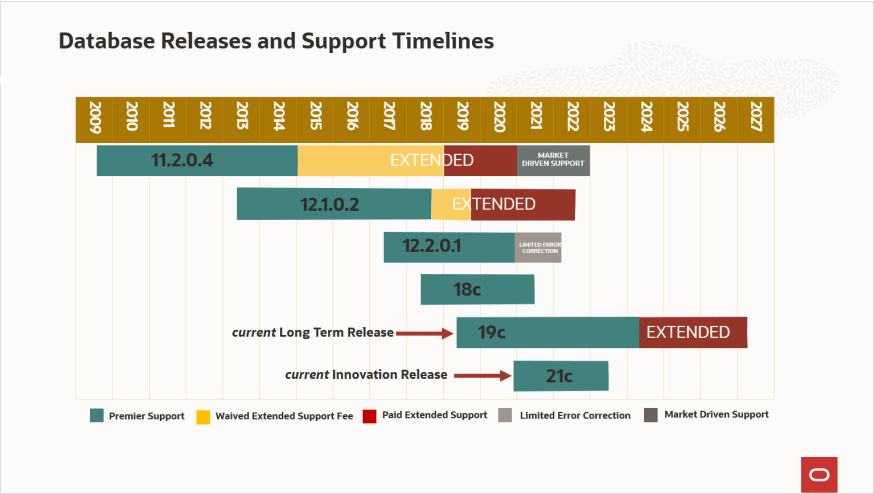Which Oracle Database version should you choose for your production databases? - DEEP
Which Oracle Database version should you choose for your production databases?
06 June 2021

11g, 12c, 18c, 19c, 21c … Oracle Database versions are numerous, and the question often arises: which one is best for installing or migrating my production databases?
The short answer, without hesitation, is: version 19c! However, as always, advice is only valuable when supported by more detailed and specific elements that help everyone make an informed choice. So, let’s go for the (slightly longer) version.
Overview of the Different Oracle Database Versions (from 11g to 19c)
First, since a diagram often speaks louder than words, let’s take a look at Oracle’s official support reference:

It’s 2021, and it’s easy to see that versions 11g and 12c (12.1.0.2 and 12.2.0.1) have long passed their “Premier Support” period, and only allow for fixes in very specific cases (Extended Support, Market Driven Support, both requiring additional paid subscriptions to standard support) and within a limited scope.
Beyond these support issues, there are other problems with these relatively old versions. For instance, 11gR2 will celebrate its 12th birthday this year (which is quite respectable), but it can no longer be installed on the latest operating system versions (such as Linux 8, Windows 2016 and above).
Even the more recent 18c will receive its last patch in June 2021.
On the other hand, 19c is classified as a “Long Term Release” and will benefit from the longest support period (at least until 2024 without extra costs).
However, this doesn’t mean you should install or migrate to 19c today and then rest for 3 years! Oracle support releases updates every quarter, which should be applied regularly to benefit from the latest functionality and security patches. Monitoring is also necessary to avoid accumulating too much technical debt and exposing yourself to unnecessary risks.
Should You Opt for Oracle Database 21c?
Finally, the latest version is 21c. Contrary to what one might think, this version will be supported for a shorter period than 19c. It is considered an “Innovation Release,” meaning it’s not intended to be supported long-term. It mainly targets customers who wish to test the latest features for their applications.
Some of these exciting new features include:
-
Support for a new native JSON type in tables
-
A new type of table: “Blockchain Tables”
-
SQL Macros (more efficient code factorization than traditional functions)
-
Simplified use of “Machine Learning” algorithms
-
In-Database JavaScript, etc.
Technological innovations are regularly integrated into the Oracle database, and it’s important to adopt them as soon as possible, in a highly competitive and evolving environment. However, be cautious not to rush into 21c without considering both its advantages (access to the latest innovations) and disadvantages (limited support duration, the need for more frequent updates).
What About Oracle Database 22c and 23c?
As for the upcoming versions (22c, 23c, etc.), there is very little information available at the moment, although some sources suggest that 23c will be the next “Long Term Release” (just like 19c is now). This will need to be confirmed by Oracle in the coming months, and we will revisit this topic in more detail when the time comes.
Whatever your migration project may be, DIGORA can assist you, particularly to avoid some unpleasant surprises that can arise if the operation is not adequately prepared! Discover here all the solutions for hosting your data, whether in the cloud or on-premise.
Contact us
Do you have any questions about an article? Do you need help solving your IT issues?
Contact an expertOther articles in the category Data & AI
IoT and M2M in Luxembourg: Unlocking Data Value
Learn how to leverage IoT and M2M data through an integrated approach combining connectivity, cloud, AI and cybersecurity to drive operational efficiency.
Published on
21 July 2025
Key Challenges in Successful Digital Transformation for Public Sector
Explore the key challenges and success factors of digital transformation for local authorities: budgets, skills, cybersecurity, inclusion, data sovereignty and sustainability.
Published on
13 May 2025
Federated Governance: A Key Pillar for Successful Data Mesh Implementation
Learn why federated governance is a critical organizational pillar in a Data Mesh architecture. A strategic issue for data-driven companies.
Published on
12 December 2023








Our experts answer your questions
Do you have any questions about an article? Do you need help solving your IT issues?
Got a project? Questions?
Send us a message and our experts will get back to you quickly.
DEEP? Your digital ally!
With DEEP, turn your IT projects into measurable and sustainable growth drivers.



